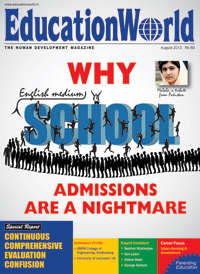 I read your cover story ‘Why English-medium school admis-sions are a nightmare’ (EW August) with great interest. You’ve pointed out the plain truth that right across the country, the demand is for English-medium schools, while the supply is of vernacular medium schools which state governments insist on shoving down the throats of an unw-illing public. Wearing the garb of great lovers of vernacular languages, politicians who make sure their children are in English-medium schools, insist upon the poor and vulnerable learning in regional languages and/or mother tongue.
I read your cover story ‘Why English-medium school admis-sions are a nightmare’ (EW August) with great interest. You’ve pointed out the plain truth that right across the country, the demand is for English-medium schools, while the supply is of vernacular medium schools which state governments insist on shoving down the throats of an unw-illing public. Wearing the garb of great lovers of vernacular languages, politicians who make sure their children are in English-medium schools, insist upon the poor and vulnerable learning in regional languages and/or mother tongue.
To impose vernacular education upon children of the poor without assuming any responsibility for their employment is callous and shameful, adding to the misery hypocritical politicians want to heap upon India’s poor. Public opinion is unanimous that education is the panacea for the widespread ills of poverty and hardship. But the subject of what type of education the poor require is glossed over. Education-World deserves public gratitude for boldly and unequivocally specifying what type of education the poor need for climbing out of the rut of poverty.
Aslam Farooqi
Hubli (Karnataka)
Hasty initiative
Your special report on the continuous and comprehensive evaluation (CCE) scheme is well-written and researched (EW August). The varying perspectives of school principals and educationists confirm that even four years after it was introduced, there is huge confusion about implementation of CCE in schools. I attribute this to CBSE’s hasty decision to implement it without consulting all stakeholders, especially teachers. This hurried initiative has been compounded by lack of an integrated and comprehensive teacher training policy. School teachers who for the past 50 years have been following the test/exam assessment system, need intensive training to switch to an evaluation scheme which focuses on both academic and co-curricular student achievement. No wonder that untrained teachers are fumbling and muddling through CCE.
To put the system back on the rails, CBSE must mandate comprehensive teac-her training, and allow for continuous impro-vement of the CCE scheme to suit local conditions. Otherwise as you point out, CCE will further dilute academic standards and encourage grades inflation.
Aruna Deshpande
Mumbai
IIHS clarification
I write on behalf of IIHS with respect to the article ‘Urgent need for urban planners’ published on the Career Focus page (EW August).
We have noticed a couple of errors in the article. First, the Indian Institute for Human Settlements (IIHS) has been incorrectly mentioned as Indian Institute of Human Settlements. Also, the article incorrectly mentions IIHS as India’s first independently funded and managed inter-disciplinary national university for research and innovation. However, IIHS is India’s first prospective independently funded and managed inter-disciplinary national university for research and innovation that focuses on ongoing urban and development transformation. Please publish a corrigendum in your next issue.
Pallavi Jha
Gutenberg Communications
Bangalore
Sorry about these grave errors — Editor
Brewing crisis
Your Chennai correspondent Hema-latha Raghupathi has sounded a timely warning about imposition of the duty of providing mid-day meals to gover-nment primary school children upon teachers (Education News, EW August). Typically, the world’s largest mid-day meal scheme was rolled out as a populist measure without adequate attention paid to implementation details. As it is, most government schools are housed in crumbling build-ings with children of several grades crowded into one classroom. Toilets, separate kitchens and often drinking water, are conspicuously lacking.
According to some estimates, there is a national shortage of over one million school teachers and many government schools have just one-two over-burdened teachers, who in addition to teaching are expected to do census and election duty. To pile on the additional responsibility of supervising — and often cooking — mid-day meals without adequate storage, water and kitchen facilities is unfair and cruel. Little wonder that food contamination and poisoning is common in government schools even as very little learning happens in classrooms.
I wholly agree with the point made by you in the cover story that education expenditure needs to be doubled immediately and spent efficiently. A crisis of major proportions is brewing in government schools which are already suffering a continuous flight of children — an ominous portent indeed.
T. Raman
Coimbatore
Private tuitions menace
Thanks for the Teacher-2-Teacher essay ‘Teachers need to relearn teach-ing’ by Lionel Cranenburgh (EW July). Schools are temples of learning which shape the aspirations and future of students and teach them self-reliance. Therefore they should not be commercialised. Unfortunately there are very few teachers who take personal interest in students. Most of them are there for monetary gains. An average student doesn’t need coaching classes; school teachers’ voluntary assistance and self-help is enough. But teachers insist on private tuitions.
To combat the tuitions menace, schools must ensure smaller classes to enable teachers to give individual attention to students. Crowded classrooms and the pressure to complete syllabuses force teachers to neglect some students who have to take private tuition.
Mahesh Kumar
Delhi